I have received several E-mails over the last few weeks that suggest that the economics…
We do not reap the seeds we sow – someone else sowed them long ago!
In 1944, Swedish economist Gunnar Myrdal published his famous 1,500 page work – An American Dilemma: The Negro Problem and Modern Democracy, which documented the conflict in American society driven by what he called the “American Creed”, which is about the “ideals of equality and liberty” and the obvious “moral lag in the development of the nation”, which at the time was referred to as “the Negro problem”. More recently, a book by American academic Nancy DiTomaso – The American Non-Dilemma – challenges the earlier notion and argues that whites in America are able to exploit racial inequality without doing “bad things” to blacks. Both works are interesting, but the more recent work fits with my current research because it introduces a new conflict, albeit unwittingly, that centres on whether you reap the seeds you sow.
This topic was also raised in the Melbourne Age article today – The lucky country? Try selfish and deluded, too – which analysis the mean-spirited nature of Australia society in the context of our recent cuts in foreign aid – all in the name of “living within our means”.
The Age article begins:
We think of ourselves as a generous people and many Australians are. But it’s a form of national psychosis when a rich, secure nation unblinkingly spends more on killing people than helping them … The overall aid budget will fall to 0.33 per cent of gross domestic product and the defence budget will rise to 2 per cent, in an increase 10 times as big as the aid cut.
The way we are able to “live with a world of obscene disparities” is by deluding ourselves that:
… our lives, careers and successes are all our own work. If others struggle, that’s their fault, their own mistakes, or lack of skills or work ethic.
This is of course the classic neo-liberal myth – that there is no such thing as society or community interdependencies and that we reap the seeds we sow.
This has been a very familiar theme as governments abandoned the notion that mass unemployment was a systemic failure of the economy to create enough jobs, and instead reframed it as an individual failure – indolence, attitude, poor skills etc
In the US, this individualistic perception is regularly articulated and usually mixed with words such as freedom, enterprise, and all the other buzzwords that frame now delusional understanding of our place in the world.
The Age article notes that:
I have never seen prosperous Australians work as long and hard as I have seen Africans toil just to survive. People living in rural Africa struggle for everything we take for granted. Fetching water and firewood can involve a long walk every day. Our essential services – running water, sanitation, power and healthcare – are unattainable luxuries.
Villagers get up before dawn and work until dark even when they are ill, which is often. Millions of Africans have to be resourceful (they make fine floors of polished dung), brave and resilient to survive in mud huts housing families with no visible means of support, save for some meagre crops and livestock if they’re lucky.
Which should be the end of the debate. It is not about hard work or enterprise or commitment or determination or resilience.
A lot of the inequality that arises across and within nations is about who helps who to get a “head-start in life”. That is one of the purposes of development aid – to redress the lack of capital in societies so that basic resources are provided.
Australians are too mean to see that and support political parties who deny a few measly dollars to the poorest nations in the world because we “cannot afford it”.
The Age article refers to a recent major report – Global Wealth Report 2013 – which found that:
Ranked 9 among the top 12 countries by HNWI population, Australia saw an increase of 15.1% in 2012 while wealth grew by 15.5% to $625 billion, outpacing global growth rates.
[HNWI = high-net-worth-individual]
Many of these individuals have led the charge in recent years in the political attacks on public deficits and welfare spending, ignoring the massive corporate welfare budget they receive themselves from the public sector.
Which one of them has ever given the public funds they have received in one way or another back? Answer: A small number approaching zero.
The Age article says that
Wealthier Australians win life’s lottery not just by being born here, but by being born into families that provide an upbringing of good health and education plus valuable social networks … How many of us really do it all on our own, without calling on any relatives or social and business contacts?
All the evidence available (including analysis in the Global Wealth Report) tells us that the vast inequalities in wealth holdings reinforce themselves that the “benefits of such wealth are intergenerational” and that there is considerable “persistence” meaning that “10 generations or more have to lapse before the wealth of an individual in North America is completely independent of the wealth of their ancestors”.
The conclusion in the Age article is that:
If we still insist we don’t have money to spare, and anything we make is rightly ours to keep, then we are a self-deluded nation. We will never convince anyone but ourselves that good people can live such privileged, selfish lives.
But the idea of social networks and inherited advantage is very interesting. It not only explains income and wealth disparities but also helps us understand regional disparities where wealth or lack of it creates vastly different spatial mobility patterns and responsiveness to industry shifts.
The poor are locked in by housing and transport circumstances to areas that may lose jobs and cannot move to other areas where new jobs might open up.
Nancy DiTomaso’s challenge to the old Myrdal conjecture is about social networks. She summarised the arguments from her book in a New York Times article earlier this year (May 5, 2013) – How Social Networks Drive Black Unemployment – which was part of “The Great Divide” series on inequality that the NYT was running.
Basically, she says:
1. The downturn has been very bad for black Americans relative to the non-black cohorts.
2. “… regardless of the economy, job prospects for African-Americans have long been significantly worse than for the country as a whole.”
3. This is not solely due to “racial discrimination”. Rather, she found “a somewhat different culprit: favoritism”.
4. “Getting an inside edge by using help from family and friends is a powerful, hidden force driving inequality in the United States” and this “favoritism has a strong racial component”.
5. White Americans metwork better than African-Americans and so information about where new job openings are is more readily transmitted to the members of these networks. Outsiders get locked out of these infomration networks.
6. “while exclusion or discrimination is illegal, inclusion or favoritism is not – meaning it can be more insidious and largely immune to legal challenges”.
The relevant point that the social networks’ literature challenges is the central idea from mainstream economics that the return one gets from labour market participation is reflection of your skill, experience and endeavour (so-called marginal productivity theory).
Nancy DiTomaso writes:
In this context of widespread networking, the idea that there is a job “market” based solely on skills, qualifications and merit is false. Whenever possible, Americans seeking jobs try to avoid market competition: they look for unequal rather than equal opportunity. In fact, the last thing job seekers want to face is equal opportunity; they want an advantage. They want to find ways to cut in line and get ahead.
The capacity to network is not equal across the occupational structure – low-wage jobs are fairly open whereas the better jobs are relatively closed (if not entirely closed).
The white networks channel like souls through their systems and exclude others – but, while that sort of behaviour is not eclusive to whites, it is the fact that “whites are more likely to hold the sorts of jobs that are protected from market competition, that pay a living wage and that have the potential to teach skills and allow for job training and advancement.”
She also documents how people are oblivious to the help that their background etc gives and typically consider they have made it on their own steam.
But these people also deeply oppose affirmative action and on closer scrutiny she found that their major complaint was that it overrode the network influence.
I did some data analysis to see what it showed. The data comes from the BLS CPS databases (and I would use FRED2 rather than the BLS to extract it given the changes to the BLS site which have made it harder to get more detailed data).
The first graph shows the unemployment rate for whites and blacks (and Hispanic) for various periods (depending on the data availability). The grey bars are the NBER recession (peak to trough) dates.
As you would expect both series (ignoring the Hispanic) are highly cyclical and asymmetric – sharp rises as the economy moves into recession followed by slow decline as growth ensues.
While not obvious to the naked eye, recession tends to push up the white unemployment rate proportionately more than the black unemployment rate whereas in the growth phase that pattern reverses.
We can see that in the next graph which plots the ratio of the black unemployment rate to the white unemployment rate. You can also see that the ratio is lower now than it was (on average) in the 1990s and 1980s
Next we consider employment. Remember that the unemployment rate reflects a confluence of factors including the participation rate, the labour force and employment growth rates.
The next graph Shows the annual employment growth for US whites and blacks from January 1972 to September 2013. Once again the shaded bars represent the NBER recessions (peak to trough).
What we observe is something interesting. In the downturn the contraction in black employment is proportionately higher than it is for whites but in the recovery phase there appears to be a tendency for the black employment growth rate to overshoot the white growth rate.
Take the current downturn as an example (shown in the next graph). From peak to trough, white employment fell by 4,904 thousand or 4.1 per cent, whereas black employment fell by 1,035 thousand or 6.4 per cent.
However, in the upturn, white employment has grown by 256 thousand (0.2 per cent) whereas black employment has grown by 1,210 thousand or 8.0 per cent, thus wiping out the losses incurred in the downturn.
Moreover, while recessions cause a smaller proportionate loss of jobs for whites, the recoveries tend to be better for blacks.
This graph starts at January 2007 and traces the employment growth since then (to September 2013).
The next graph shows the ratio of white to black employment since January 1972. The downward trend doesn’t mean there isn’t a significant proportionality issue here – with white employment still 7.5 larger than black employment even though the underlying population ratio is around 6.4.
In December 1982, at the end of the recession, the employment ratio was 9.55 while the population ratio was 8.0. Both have been declining.
The next graph – the ratio of the two employment-population ratios (white over black) – shows that the whites are still doing better proportionately than the blacks even though the white population is not growing as fast as the black population.
Turning now to labour force participation rates, the next graph shows the white and black rates since January 1972. The white rate grew faster up until the early 1990s, and after some compression through the next decade, both have fallen steadily since.
The most recent recession has seen an acceleration of the declining participation (as a result of a lack of job opportunities and rising numbers of discouraged workers), although since the trough, the white partipication rate has fallen by 2.8 points compared to the decline in the black rate of 1.4 points.
Finally, to summarise the relative movements in participation rates for whites and blacks, the following graph presents the ratio of the two (white on black) from January 1972. If past behaviour is anything to go by, the current decline the ratio as some way to go before an upturn will be seen.
Conclusion
While none of this refutes the importance of social networks in perpetuating income and wealth inequalities, it seems that the story might be somewhat more complex than the simple whites get access to the better jobs through networks and the Blacks miss out
Clearly, the distribution of job opportunities between so-called good jobs and bad jobs is not continuous. There are rigid immobolities between the two, and social networks are important in determining who gets access to the good jobs.
Nancy DiTomaso also recognises that pure discrimination is still a major screening force, which keeps some cohorts (for example, blacks) from gaining access to the better jobs.
The data shows that in the downturn the economy sheds more jobs that blacks hold but adds them back more quickly in percentage terms in the recovery.
But with barriers to the better jobs firmly in place, the capacity for blacks in America to experience social mobility is limited.
The evidence also suggests that whites are starting to lose out as well (but are still proportiontely in front of the blacks).
That is enough for today!
(c) Copyright 2013 Bill Mitchell. All Rights Reserved.
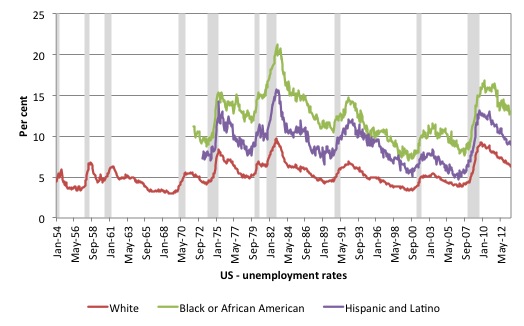
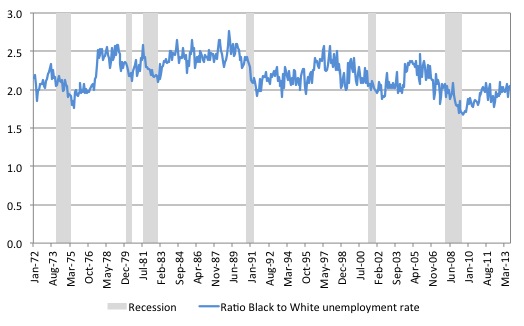
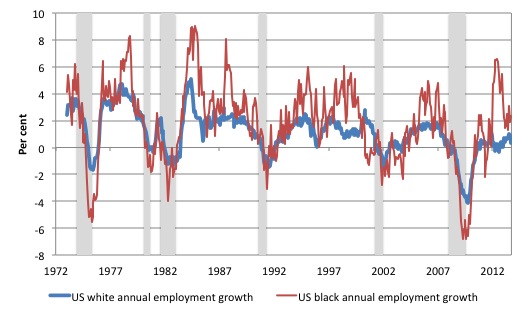
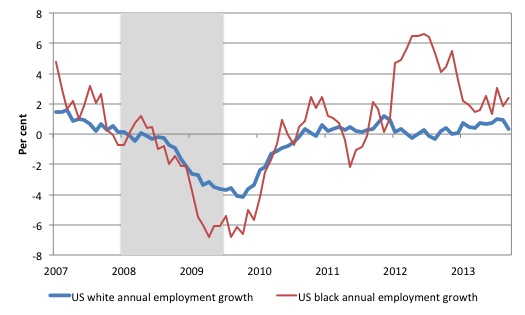
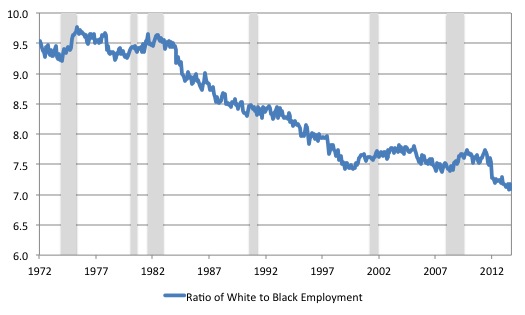
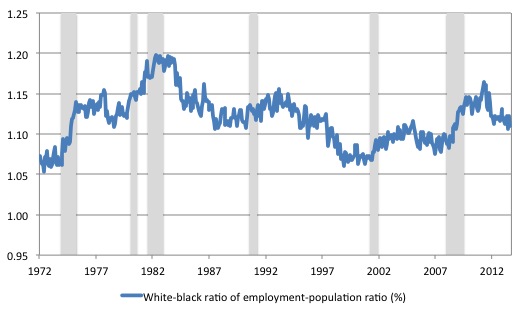
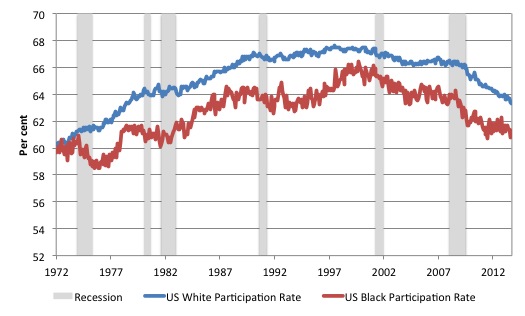
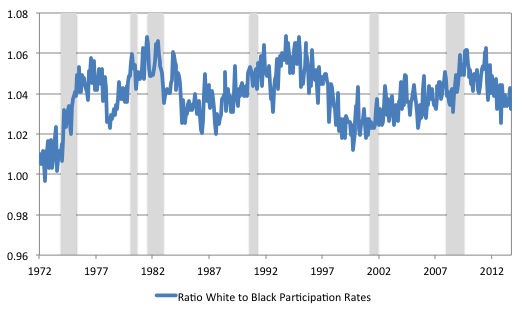
I’m looking forward to Ralphs response.
I realize you have your religion of the tabula rasa myth, and no amount of modern genetic research will ever convince an older gentleman such as yourself that man is not created equal, but why waste your breath on this?
It really calls into question your reasoning ability. How is it that blacks, who have been in America for 400 years, still cannot integrate into European society, while East Asians arrive penniless, work as laborers, and their children are perfectly fine? What favor do the millions of Asian immigrants receive?
You can’t answer that question, and won’t even try. Because to do so would force you to accept the uncomfortable truth of genetic differences in ability.
What is tragic is that your economic models can work with this reality. We can actually make the lives of these people better, but they require cultural structure that liberal individualism denies to them.
“The data shows that in the downturn the economy sheds more jobs that blacks hold but adds them back more quickly in percentage terms in the recovery.”
Which again would equate with blacks working in more marginal/lower end jobs. Those jobs that don’t have that much value for the employer, and also goes along with the fact that most of the jobs created in the recovery have tended to be lower end jobs — fast food, retail, etc.
The other, and probably more important point, is the hypocrisy of pushing the idea that the job market is a based on one’s personal knowledge and skill while at that same time not wanting that applied to one’s own situation.
This is in response to Ben:
You’re comment conveniently ignores the fact that the millions of Africans were brought into America as slaves by whites who never had any intent to ‘integrate’ them into white society.
There are networks and then there are networks. Society has merely been replaced by occult society into which it seems not all are entitled to membership. Class, nepotism and patronage are key determinants for career success in both the private and I’m sorry to say the public sector as well. Race as a major factor may have been surpassed. Although real discrimination still exists, the employment discrepancies seen today, where I live at least, seem to have far more to do with the social position, within the current money obsessed hierarchy ones family has achieved, rather than to skin color or where you were born. I suspect the same is true elsewhere as well. If your family hasn’t achieved some status due to past discrimination you will continue to have difficulty today. Racial discrimination may now be like other forms currently used politically as red herring issues to divide and deflect attention from deeper truths about the ordering of society.
Social hierarchies are ubiquitous,existing throughout history and in most cultures. The basis for the order of a hierarchy is variable and may be selected by those currently empowered within an existing social structure. The current hierarchy was inevitable with wealth overwhelmingly capable of manipulating governance and opinion while the illusion of strong democratic influence is carefully sustained.
Young people of any ethnicity who really believe in the Neo Liberal myths yet do not belong to the correct networks now faithfully spend themselves into deep holes on education only to find they are still unemployed or underemployed, deeply in debt and hopelessly pitted against all odds in competitions that don’t really exist afterward. I have seen this time and time again.
The net result of the choice of this social network as selection criteria are that many of our private and public institutions have fully and completely embraced mediocrity, ever widen the output gap and, limit our directions, the definitions of progress, to following the meanderings that maximize wealth for the fortunate few for whom neo liberal economic policy was designed to serve..
Ben, I should point out that there are thousands of examples of unrelated children from every corner of the planet adopted into childless North American or European (white) families of means. These children never grow up and do poorly, and especially not because of a genetically innate lack of fitness for life within the society.
No, unless we are scientifically cloned none of us are born “equal” to anyone else; and yet we are equal in our ability to contribute equal value to the enrichment of a fair, cooperative society.
Bill
Sorry for being off topic, but wanted to draw your (& readers) attention to a couple of significant pieces, one from a writer you’ve quoted before:
http://blogs.telegraph.co.uk/finance/ambroseevans-pritchard/100025983/italys-mr-euro-urges-latin-front-warns-germany-wont-sell-another-mercedes-in-europe/
http://www.theguardian.com/commentisfree/2013/nov/04/us-trade-deal-full-frontal-assault-on-democracy
Thanks for your superb blog as ever Bill
Sorry Ben, the question has already been put to rest.
Source
Randolph Duke: Pay up, Mortimer. I’ve won the bet.
Mortimer Duke: Here, one dollar.
Randolph Duke: [chuckling] We took a perfectly useless psychopath like Valentine, and turned him into a successful executive. And during the same time, we turned an honest, hard-working man into a violently, deranged, would-be killer! [laughs] Now, what are we going to do about taking Winthorpe back and returning Valentine to the ghetto?
Mortimer Duke: I don’t want Winthorpe back, after what he’s done.
Randolph Duke: You mean, keep Valentine on as managing director?
Mortimer Duke: Do you really believe I would have a nigger run our family business, Randolph?
[Valentine’s eyes widen with outrage]
Randolph Duke: Of course not. Neither would I.
Ben,
Yes human being are not equal in ability. Clearly you must be one of the brilliant few to have recognized this.
Ability has some correlation with success, but it is far less than you probably believe. I’ve known successful (in terms of money) people who are fairly stupid. The usual reason is birth into an affluent or wealthy family. Another useful quality is greed. Is that a virtue?
Given that human beings are not the same, just how unequal do we want society to be? It would be hard to argue that there is any such thing as a ‘natural’ system, or we would not have had Kings, who achieved their rank by being the son of a King. The system we live under is not ordained by Heaven. Some inequality is obviously of benefit to society, but I think you can argue that we are beyond the optimum level at this point, in terms of morality or economic efficiency.
Keith gave you something to think about. I would add that Asians come here from cultures that value education, and hard work. Africans were slaves for a century and a half, and afterward were fiercely subjugated. It’s not a great surprise that they have fared less well. I can’t quantify this, but I would also say that in the minds of many people, Asians count as more or less ‘white’.
Australia may be even worse than USA when it comes to Labour market discrimination.
For example, those interested may read the following paper by my colleagues, which highlights the discrimination faced by immigrants from Asia:
http://www.worldscientific.com/doi/abs/10.1142/S021759081000395X
An earlier ungated version of this paper can be found at:
http://ftp.iza.org/dp1167.pdf
Cheers,
Sriram
I’m a Kenyan living in Kenya and I don’t believe in foreign aid. All it does is to fund luxury spending. What rich countries need to do is to stop laying off their public sector workers. This is harming Kenya’s exports like tourism, coffee, tea, flowers, fruits, and vegetables.
SteveK9:
I am a first-generation Asian-American from the Philippines. I had almost no social advantages when I arrived in the US in 1971, save one: I had married a USAF officer I met while working at Clark A.B. back in my homeland. Nonetheless, I brought myself up through the US economic system by founding what became a successful business, which I later sold, then taking the proceeds from the sale into the markets, where I have become very successful since. Nearly everything I have learned along the way has come from careful observation – and the rise of the Internet of course made it far easier for me to gain knowledge that in the past might have required a college education.
Despite my own experiences, we insisted that our five children pursue a good education as it would provide them more choices going forward. Although I was proud of my humble beginnings in America as a seamstress, I wanted more for my daughters and all five of my children now have graduate degrees and good, stable jobs. My youngest has decided to pursue investment knowledge as her preferred path to success – when I asked her about MMT and was it being taught at any of the classes she took (she graduated from the University of Miami) she said it is not well understood (and usually ridiculed). The microeconomics class she took was using the textbook from Greg Mankiw (whom Bill has regularly disparaged). But both of us have done well in certain markets, such as that for sovereign bonds (like US Treasurys) because we realize there will be demand for these despite large fiscal deficits from the issuing nations. As there can be no “crowding out” we knew how we wanted to trade them.
I liked this installment of the blog – it is very true that most Americans I know firmly believe they are (mostly) responsible for their own success and little consideration is given to built-in advantages. I guess this is because these advantages are so ingrained as to be almost invisible (something like the fish who never realizes he’s in a tank). But for someone like me who was a true “outsider”, these advantages were something I had to struggle against almost every day.